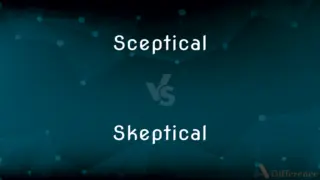Billion vs. Trillion — What's the Difference?
By Tayyaba Rehman & Maham Liaqat — Updated on March 31, 2024
A billion is 1,000 millions, while a trillion is 1,000 billions.

Difference Between Billion and Trillion
Table of Contents
ADVERTISEMENT
Key Differences
A billion represents a thousand million (1,000,000,000) in both the short and long scale number systems, commonly used in American English and increasingly adopted worldwide. Whereas, a trillion in the short scale, predominantly used in American English, signifies a thousand billion (1,000,000,000,000), indicating a significantly larger quantity.
In financial contexts, a billion often refers to substantial sums relevant to national economies, corporate revenues, or government budgets. On the other hand, a trillion is used to describe larger economic measures, such as gross domestic product (GDP) of large countries, global market values, or national debts, showcasing the massive scale it represents.
Historically, the term "billion" had different meanings in the short scale (used in the United States and increasingly worldwide) and the long scale (used traditionally in many European countries), where it meant a million million. However, "trillion" in the long scale would mean a million billion (1,000,000,000,000,000,000), a figure not commonly encountered in practical calculations today.
The usage of "billion" and "trillion" illustrates the exponential growth in quantities, where each term represents a thousandfold increase from the previous (million to billion to trillion). This exponential increase highlights the vast difference in scale and impact when discussing quantities, especially in economics, astronomy, and scientific measurements.
While both terms are used to describe large numbers, the context in which they are used can significantly affect their interpretation. In discussions of national budgets, demographics, or the tech industry, the difference between billions and trillions can denote varying degrees of scale, from substantial to astronomical.
ADVERTISEMENT
Comparison Chart
Numeric Value
1,000,000,000 (10^9)
1,000,000,000,000 (10^12)
Scale
Thousand million
Thousand billion
Usage Context
National economies, corporate revenues
Large economic measures, GDP of large countries
Historical Meaning
In long scale: a million million (not commonly used now)
In long scale: a million billion (rarely used)
Representation
Substantial sums, but smaller than trillion
Significantly larger sums, indicating major economic sizes
Compare with Definitions
Billion
Represents significant, but more common, large-scale values.
The government allocated a billion dollars for infrastructure.
Trillion
In scientific notation, a trillion is written as 10^12.
The human body contains trillions of cells.
Billion
Reflects substantial amounts in financial and statistical data.
The project's budget was just under a billion.
Trillion
Represents extremely large quantities, often in global economics.
The global tech market is valued in the trillions.
Billion
Used to denote large quantities in economics and demographics.
Over a billion people use the internet daily.
Trillion
Used for astronomical or scientific measurements.
The observable universe is estimated to be 93 billion light years in diameter, encompassing trillions of stars.
Billion
In scientific notation, a billion is written as 10^9.
Earth is about 4.5 billion years old.
Trillion
A trillion is 1,000 billions.
The national debt exceeded fourteen trillion dollars.
Billion
A billion is 1,000 millions.
The company's valuation reached a billion dollars.
Trillion
Signifies vast, often incomprehensible, quantities.
There are trillions of microorganisms living on and inside the human body.
Billion
Denoting a quantity consisting of one million million items or units in Great Britain
Trillion
One million million in the United States
Billion
A billion is a number with two distinct definitions: 1,000,000,000, i.e. one thousand million, or 109 (ten to the ninth power), as defined on the short scale.
Trillion
A trillion is a number with two distinct definitions: 1,000,000,000,000, i.e. one million million, or 1012 (ten to the twelfth power), as defined on the short scale.
Billion
The cardinal number equal to 109.
Trillion
The cardinal number equal to 1012.
Billion
Chiefly British The cardinal number equal to 1012.
Trillion
Chiefly British The cardinal number equal to 1018.
Billion
An indefinitely large number.
Trillion
A million million: 1 followed by twelve zeros, 1012.
Billion
A thousand million ([https://en.wikipedia.org/wiki/Long_and_short_scales#Comparison logic: 1,000 × 1,000^2]): 1 followed by nine zeros, 109; a milliard
Trillion
A million million million: 1 followed by eighteen zeros, 1018.
Billion
A million million ([https://en.wikipedia.org/wiki/Long_and_short_scales#Comparison logic: 1,000,000^2]): a 1 followed by twelve zeros; 1012
Trillion
A statistic formed by a player playing some number of minutes, but recording no stats.
Billion
An unspecified very large number.
There were billions of people at the concert.
Trillion
According to the French notation, which is used upon the Continent generally and in the United States, the number expressed by a unit with twelve ciphers annexed; a million millions; according to the English notation, the number produced by involving a million to the third power, or the number represented by a unit with eighteen ciphers annexed. See the Note under Numeration.
Billion
According to the French and American method of numeration, a thousand millions, or 1,000,000,000; according to the English method, a million millions, or 1,000,000,000,000. See Numeration.
Trillion
The number that is represented as a one followed by 18 zeros;
In England they call a quintillion a trillion
Billion
The number that is represented as a one followed by 12 zeros; in the United Kingdom the usage followed in the United States is frequently seen
Trillion
The number that is represented as a one followed by 12 zeros;
In England they call a trillion a billion
Billion
The number that is represented as a one followed by 9 zeros
Trillion
One quintillion in Great Britain
Billion
Denoting a quantity consisting of one thousand million items or units in the United States
Common Curiosities
What is the difference between a billion and a trillion?
A trillion is a thousand times larger than a billion, representing vastly different scales of quantity.
How is a billion defined in different countries?
A billion is universally recognized as 1,000 million (10^9), though historically, in the long scale system, it meant a million million.
What implications does using billions vs. trillions have in financial reporting?
The terms convey different levels of financial scale, from substantial company revenues (billions) to large-scale economic indicators like GDP (trillions).
How has the usage of "billion" and "trillion" evolved?
The usage has shifted towards the short scale globally, where a billion equals a thousand million and a trillion equals a thousand billion.
How does the concept of a billion compare to a trillion in practical terms?
While both are large numbers, a trillion denotes a quantity that is a thousandfold larger than a billion, affecting perceptions and decisions in economics, policy, and science.
Is there a psychological impact when people hear "billion" vs. "trillion"?
Yes, the psychological impact varies; "trillion" often conveys a sense of enormity and complexity beyond the more familiar "billion."
Why are trillions significant in economics?
Trillions indicate major economic sizes, relevant for discussing national debts, global markets, and GDP of large countries.
Can the human mind easily comprehend the difference between billions and trillions?
The vast difference makes it challenging for the human mind to truly grasp the scale between billions and trillions intuitively.
Are there visual aids that can help people understand the difference between billions and trillions?
Yes, visual comparisons, such as stacks of currency or scaled diagrams, can help illustrate the vast difference between these quantities.
Why are trillions often used in scientific measurements?
Scientific fields deal with vast quantities, whether in astronomy, biology, or physics, making trillions a practical measure.
How do businesses and governments operate differently with billions vs. trillions?
Operations involving billions focus on substantial but manageable scales, whereas trillions often involve strategic decisions impacting national or global scales.
How do billions and trillions affect individual perception of value?
The larger the number, the more abstract it becomes, potentially diluting the perceived value or urgency associated with financial and policy decisions.
How do educators teach the concept of billions and trillions?
Educators often use real-world examples, scientific notation, and visual aids to convey the magnitude of these numbers to students.
What role do billions and trillions play in global demographics?
These terms help quantify population statistics, economic conditions, and resource distributions on a global scale.
What future trends might necessitate the use of even larger numbers?
Advances in technology, increases in global population, and the exploration of space may require the use of terms beyond trillions to describe quantities accurately.
Share Your Discovery

Previous Comparison
Feast vs. Dinner
Next Comparison
Sahara vs. SahelAuthor Spotlight
Written by
Tayyaba RehmanTayyaba Rehman is a distinguished writer, currently serving as a primary contributor to askdifference.com. As a researcher in semantics and etymology, Tayyaba's passion for the complexity of languages and their distinctions has found a perfect home on the platform. Tayyaba delves into the intricacies of language, distinguishing between commonly confused words and phrases, thereby providing clarity for readers worldwide.
Co-written by
Maham Liaqat















































